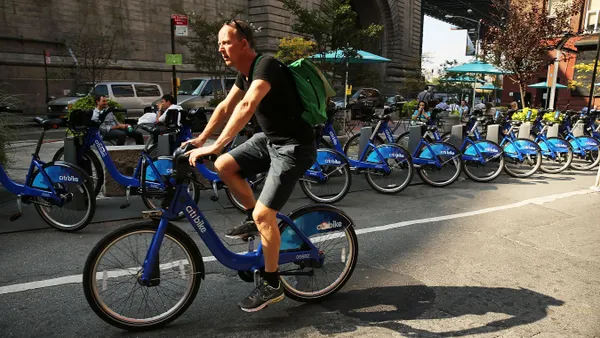Dive Brief:
- Toyota, Japan’s largest automaker, and SoftBank, one of the country’s biggest tech companies, will partner to create a "safer and more comfortable mobility society." The two will form a joint venture company, MONET Technologies Corporation, before the end of fiscal year 2018.
- The first phase of MONET’s operations will include vehicle dispatch services for local public agencies and private companies, such as corporate shuttles. Eventually, the companies will work on business-focused self-driving vehicles, including mobile offices, hospital shuttles that allow for onboard medical examinations or delivery vehicles with on-board food prep.
- “SoftBank alone and automakers alone can’t do everything," Junichi Miyakawa, chief technology officer at SoftBank Corp and CEO of the joint venture, told Reuters. “We want to work to help people with limited access to transportation."
Dive Insight:
The deal represents another partnership between automakers and tech companies, as the future of mobility runs through artificial intelligence (AI), autonomous driving and other big data projects. SoftBank has already made significant investments in ride-sharing companies, and has worked on internet of things (IoT) devices that Toyota will apply to its mobility initiatives. Softbank has also partnered with General Motors on autonomous technology.
As tech companies like Google, Apple and Amazon also eye their own autonomous vehicle projects, it’s clear that automakers need tech partners to keep innovating.
“We are trying to take traditional car making into new fields,” said Toyota President Akio Toyoda at a press conference, according to Reuters. “We realized that SoftBank shares the same vision when it comes to the future of cars, so it’s time that we partner together.”
MONET’s applications, which the two partners call Autono-MaaS (autonomous mobility as a service) businesses, also signal a forward-looking opportunity for autonomous vehicles. Rather than thinking of them as a way to get from one place to another, this approach allows passengers to take advantage of the fact that they are not driving to accomplish tasks.
Even though the Autono-MaaS products won’t launch until the second half of the 2020s, it’s a signal of where the technology could go, and one that other automakers are likely to start planning towards as well.









